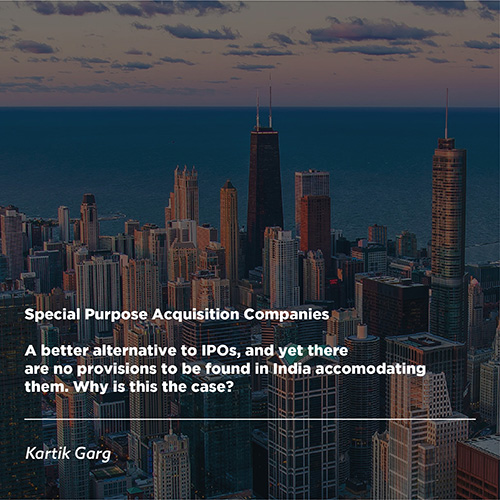Special Purpose Acquisition Companies: Why India needs the “Blank Check Company” to thrive.
Let us begin with a scenario- Imagine that you’ve acquired a suitcase for a price of five bucks. You then proceed to go to a stock exchange, try to convince people that said suitcase is going to be worth something big, and accordingly ask the people for investments, hoping that they’ll be willing to bank on the potential prospects that investing in the suitcase might bring their way. You then take your suitcase, now filled with funds you’ve raised from public investments, and invest in a company that shows promise, even if they’re not necessarily aware of their own worth.
The above premise describes how a Special Purpose Acquisition Company or a SPAC works. A relatively new phenomenon, SPACs emerged in the 1990s but people have only recently taken to the format. Created to either help companies go public or provide assistance to budding start-ups, SPACs begin as shell corporations and generate capital funds through Initial Public Offerings (IPOs). The money generated is then stored in a trust fund until a target company is identified. A subsequent merger/consolidation between the SPAC and the target company results in the latter either becoming a subsidiary or an entirely new holding company and has its shares automatically listed on the stock exchange. In the event that this process fails, the money collected is returned to the investors, and the SPAC is dissolved.
SPACs are considered a safer option, too. Generally, SPACs are led by experienced management teams with a well-established reputation in the market, and it is this confidence in the capabilities of the management team and the sponsors (who essentially become the figureheads of the company) which leads investors to act on the belief that their money is in capable hands. Compliment that with better yields than traditional IPOs and a faster process of going public, and you’ve got a winner on your hands.
Which brings us to a pressing question – why is a format that is bound to thrive in India not part of the ecosystem?
There are a couple of reasons for this – firstly, the Companies Act, 2013 eliminates companies from registration if they do not commence operations within 12 months of incorporation. This disqualifies SPACs since the process of identifying a target company, initiating the merger, and performing due diligence generally takes up to 18-24 months.
Secondly, India currently lacks a specific framework for SPACs. A safeguard for investors in SPACs exists in the form of the ability to redeem shares and ask for a refund of the amount invested, till the time a target company has been found. In India, redemption of shares isn’t permissible under existing regulations, due to a lack of specific legal provisions.
SPACs do not find room to breathe even under the Securities and Exchange Board of India Regulations. Under these regulations, a company is required to have net tangible assets of at least 3 crores in the preceding three years, have a PBT of at least 15 crores during any three of the preceding five years, and a net worth of at least 1 crore in each of the last three years. Since a SPAC certainly cannot fulfill these requirements, they do not get to operate under SEBI guidelines as well. Furthermore, an absence of operational profits and net tangible assets would prevent SPACs in India from raising funds through IPOs.
However, things are looking up. SEBI has instituted a committee to examine the feasibility of regulating SPACs in India, bringing prospects of domestic listing of start-ups. Keeping in mind that the Indian IPO market is enormous and mature, the format truly has the scope to thrive in the Indian ecosystem.
If India is to achieve its capital market capabilities, SPACs are an important, nay, essential part of the process. India’s startup ecosystem is currently the third-largest in the world, and it helps not just the people running the businesses, but the community as well. Countries like Singapore have already begun work on creating regulations for SPACs, and while it may seem like a daunting task, creating these regulations is certainly not impossible, and only spells prosperity in the future.
A discourse is not out of the question, though. I feel strongly about SPACs being part of the Indian system, but some might feel otherwise, and I’m more than curious to know your thoughts on the matter. So, how about it? Let me know how you feel about the SPAC format down in the comments, and let’s have a discussion!


Leave a Reply